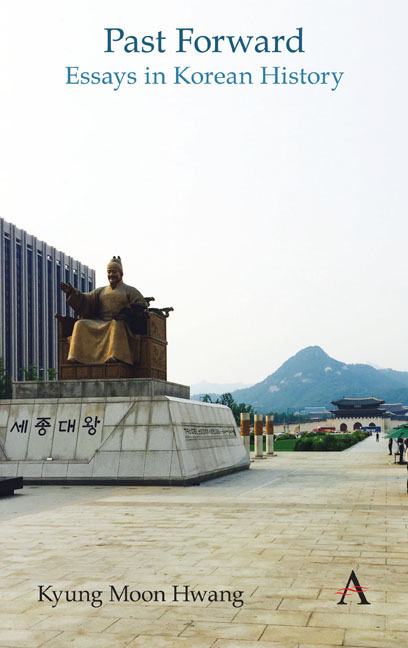Book contents
- Frontmatter
- Contents
- List of Figures
- Foreword
- Chronologies of Korean History
- Themes
- Acknowledgments
- Note on Romanization and Spelling
- Part I Circulating History
- Part II Durable Traditions
- Part III Ancient Remains
- Part IV Dynastic Depths
- Part V Modern Origins
- Part VI Challenges of Nationhood
- Part VII History Makers
- 41 Demythologizing King Sejong the Great
- 42 Modern Lady Shin Saimdang
- 43 Five Potential National Heroes
- 44 A Portrait of Great Painters
- 45 Four Young Men from 1884
- 46 Na Hye-seok
- 47 Hyundai Motors and Chung Ju-yung
- 48 Yun Isang and the East Berlin Case
- 49 Ri Young-hee, Iconoclast for Democracy
- 50 Kim Young Sam's Broad Historical Appeal
- 51 Kim Dae Jung's Historic Election
- Part VIII External Presences
- Part IX Trials of Modernization
- Part X Gripped by the Past
- Index
43 - Five Potential National Heroes
from Part VII - History Makers
- Frontmatter
- Contents
- List of Figures
- Foreword
- Chronologies of Korean History
- Themes
- Acknowledgments
- Note on Romanization and Spelling
- Part I Circulating History
- Part II Durable Traditions
- Part III Ancient Remains
- Part IV Dynastic Depths
- Part V Modern Origins
- Part VI Challenges of Nationhood
- Part VII History Makers
- 41 Demythologizing King Sejong the Great
- 42 Modern Lady Shin Saimdang
- 43 Five Potential National Heroes
- 44 A Portrait of Great Painters
- 45 Four Young Men from 1884
- 46 Na Hye-seok
- 47 Hyundai Motors and Chung Ju-yung
- 48 Yun Isang and the East Berlin Case
- 49 Ri Young-hee, Iconoclast for Democracy
- 50 Kim Young Sam's Broad Historical Appeal
- 51 Kim Dae Jung's Historic Election
- Part VIII External Presences
- Part IX Trials of Modernization
- Part X Gripped by the Past
- Index
Summary
The turbulence and turmoil of Korea's modern history and the accompanying divisions over historical understanding in South Korea, which have been fueled by the intensive changes brought forth by both (anti-communist) dictatorship and democratization, make finding agreeable national heroes a very difficult challenge. Nevertheless, there seem plenty of good candidates for this imaginary pantheon of exemplary figures. Here are five such persons from the Korean past, along with a consideration of their contemporaries with similar qualities:
Bak Je-ga (1750–1815)
As a sterling representative of the great scholar-officials of the “golden era” of the Joseon era, the late eighteenth century, Bak Je-ga seems to have done it all. A renowned writer, calligrapher and government official, Bak authored one of the most innovative works to call for reforming traditional Korean society, “On Northern Learning.” This book epitomized the forward-and outwardlooking orientation of a circle of outstanding thinkers of his time, including the scientist Hong Dae-yong, writer Bak Ji-won, philosopher Jeong Yag-yong and King Jeongjo. The latter two are arguably just as worthy for selection, but there are already enough monarchs and philosophers on the established lists of great figures.
Yu Gil-jun (1856–1914)
Perhaps the most influential of all the “enlightenment” activists in the late nineteenth century, Yu Gil-jun was also one of the first Koreans of the early modern era to travel beyond East Asia. In fact, he journeyed around the world and wrote about what he observed. He was also an influential, pioneering minister for the Gabo Reform governments of 1894–1895. He might be tainted by his sons’ “pro-Japanese” actions in the colonial period, but it would be difficult to categorize Yu Gil-jun himself as such. (Yu declined a nobility title after Japan's annexation of Korea in 1910, which he opposed.) Closeness to Japan also disqualifies Yu's equally accomplished enlightenment contemporaries Gim Hong-jip, Gim Ok-gyun, and Bak Yeong-hyo.
An Chang-ho (1878–1938)
On the west coast of the United States, An Chang-ho is celebrated not only as one of the great patriots who fought for Korea's liberation from Japan, but also as one of the first Korean Americans.
- Type
- Chapter
- Information
- Past ForwardEssays in Korean History, pp. 127 - 130Publisher: Anthem PressPrint publication year: 2019



